[hupso_hide][hupso title=”.@CIW heads to VT, ME to build bonds with sm farmers & dairy workers!” url=”https://ciw-online.org/”]
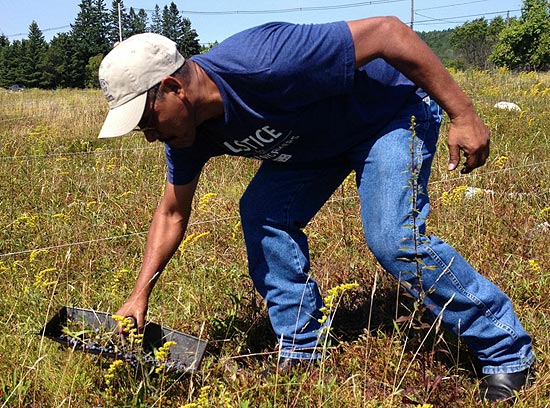
Visit carves out paths for expansion of Fair Food principles on two new fronts!
Maine has been dubbed “The Vacation State,” and with good reason. During at least one month of the year, there is probably nowhere in this country more beautiful than Maine, with its abundant fresh water ponds and lakes perfect for swimming, miles and miles of dramatic coastline, sprawling old growth forests, and rolling landscape of wild blueberry-covered hills dotted with ancient boulders.
So leave it to the CIW to turn a visit to Maine in August into a work trip…
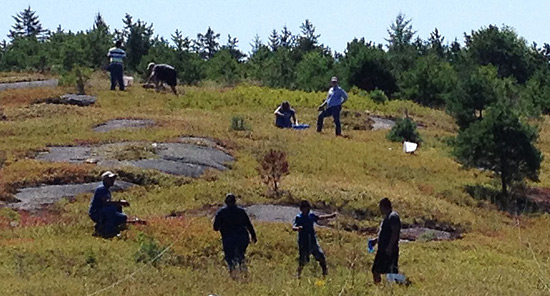
During a six-day sojourn in Maine and Vermont last week, the CIW delegation visited with members of the family farm organization “Food for Maine’s Future” to further define plans for a cooperative blueberry jam production project, lent a hand harvesting blueberries on a local farm (above), visited blueberry processing facilities (below), and spent a day with workers and farmers in Vermont to discuss their plans to launch a campaign modeled on the Fair Food Program designed to improve the lives of that state’s crucial dairy workers.
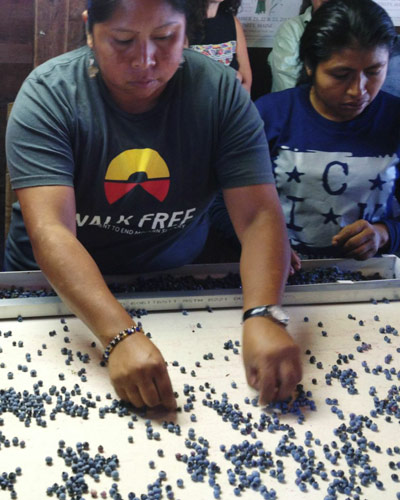
In Maine, discussions around the blueberry jam project — first started back in 2012 — took some important steps forward, as the CIW delegation and Food for Maine’s Future team spent the better part of three days hashing out the values, objectives, and structures of the cooperative that stands to break new ground in the sustainable food movement. By uniting small family farmers with workers, the plan is to bring a product to market — an organic, wild-blueberry jam from Maine — that provides both a fair price to the farmer and fair wages and working conditions to the workers, with a percentage of the final proceeds going to fund the worker-to-worker education process of the CIW’s Fair Food Program to boot! With each purchase, consumers will not only be helping those farmers and workers who produced the jam receive fair compensation for their labor, but contributing to the “best workplace monitoring program in the US” today, too.
Assuming things go according to plan, a limited test run of the jam will be available later this fall, to be distributed exclusively though the Fair Food Nation network to help raise awareness for more extensive production starting next season. So keep your eyes out for news of that special run (just 500 jars!) later this year, and contact us today at workers (at) ciw-online.org if you are interested in being part of that exclusive first batch.
From Maine, the CIW delegation headed inland to Vermont. The delegation had a very fruitful exchange with dairy workers, acting both as a consultant in the Vermont workers’ efforts to construct a campaign modeled on the CIW’s Fair Food Program, and also as a student, learning about the nature of one of the state’s largest industries and about the lives of the workers who make it run.
The delegation was taken on tours of two local farms where our hosts, Vermont’s dairy worker organization Migrant Justice/Justicia Migrante, enjoys good relations with the farmers (one of those visits is pictured here below), to gain an appreciation for the scale and dynamics of the industry…
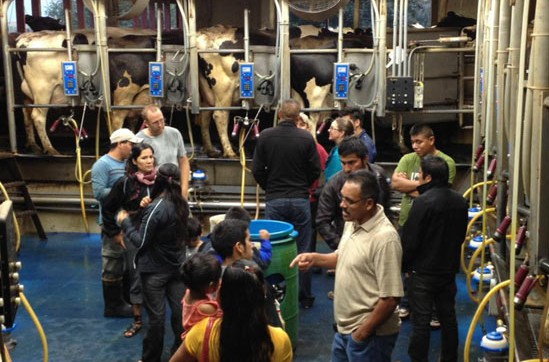
… and then met with members of Justicia Migrante (below) to share lessons from the CIW’s experience in building a novel approach to human rights protection — best described as Worker-driven Social Responsibility (WSR) — that leverages the market power of major retail food companies to ensure the fundamental human rights of workers at the base of the food industry.
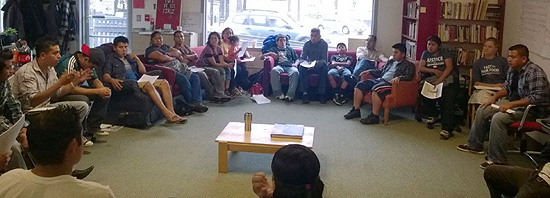
Long work hours, rough housing conditions, low wages, and social isolation on rural farms without transportation are just some of the many challenges faced by Vermont’s dairy workers every day, making dairy work one of the toughest, most thankless jobs this country has to offer. Yet demand for Vermont dairy products is growing and the state’s farms supply some of this country’s largest and best known retail food brands. This combination of factors — gross exploitation at the bottom of an industry dominated by well-known brands — is fertile ground for the WSR model, and the members of Justicia Migrante are determined to build a fairer dairy industry in their state through an approach that harnesses consumer demand for Fair Food. The CIW looks forward to collaborating with this exciting new effort in the months ahead.
 The ever-deepening bond with our friends in Maine, and with our new friends in Vermont, stands to have many, many important ramifications for the broader food movement in the years ahead — the creation of a new product that combines the best of the traditional sustainable food world with the uncompromising attention to human rights of the Fair Food movement and the expansion of the Worker-driven Social Responsibility model to a new industry chief among them.
The ever-deepening bond with our friends in Maine, and with our new friends in Vermont, stands to have many, many important ramifications for the broader food movement in the years ahead — the creation of a new product that combines the best of the traditional sustainable food world with the uncompromising attention to human rights of the Fair Food movement and the expansion of the Worker-driven Social Responsibility model to a new industry chief among them.
But there is perhaps no consequence more important than the simple fact that we here in Immokalee are sure to have more reasons to return to that magical region in the future! And with friendships like those we are forging today up north (including those among the many children of our various organizations, like Emma and Carolyn of the Food for Maine’s Futures extended family, shown here at the gathering on the eve of the CIW delegation’s departure from Maine), we are sure that our work together will be a resounding success, on all fronts.
